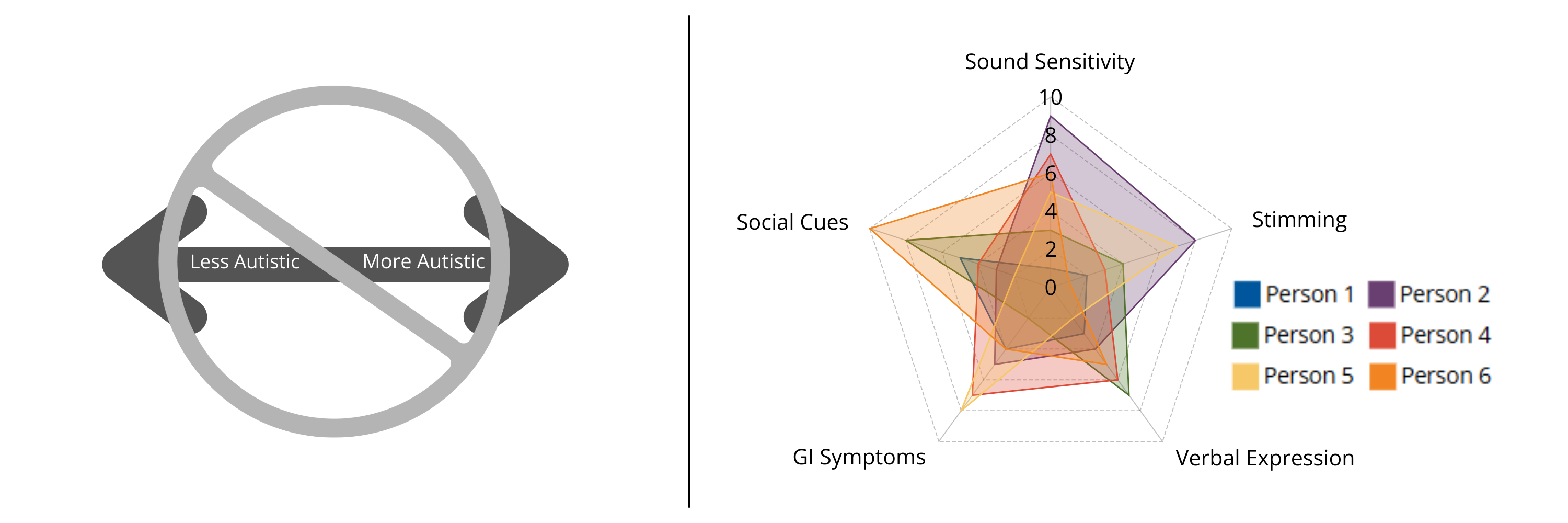Anyone can be autistic. You probably know a friend, family member, or co-worker who is autistic. Perhaps you are autistic yourself. What autism looks like, and how it affects a person’s life, can vary widely across the autism spectrum, and even throughout the same person’s lifetime.
Autism is a neurodevelopmental condition that affects how people communicate and interact, and how a person’s brain develops and functions, from infancy through adulthood. Autistic people are often straightforward or literal communicators who thrive with routine and predictability.
The autism spectrum is not that one person is “more” or “less autistic” than another. It is a group of characteristics, and each individual may have any combination of these traits to varying degrees.

For example, autism can affect how people react to sensory input. They may be more or less sensitive to lights, sound, and touch, and need specific support to participate in activities where the sensory environment would be challenging. Autistic people may also make repeated actions or movements with their body, called “stimming.” Examples of stimming include hand flapping, swaying, or repeating words or phrases. Stimming can sometimes aid in relaxation, help one cope with anxiety or overwhelm, or even help individuals express emotions, such as an autistic child may flapping their hand when happy.
Autistic people may also have unique strengths in memory, art, math, and science, or an intense, focused interest in a particular subject. Autistic individuals are often honest, non-judgmental, and may be able to “think outside the box”.
Support and accommodations
Medical or behavioral health conditions, such as sleep and gastrointestinal issues, ADHD, anxiety, and depression are common with autism. Treating or accommodating these co-occurring conditions can greatly enhance an autistic person’s quality of life.
Each autistic person has different support needs. One may require significant support in their daily life, while another may live independently but need support for co-occurring conditions. Others live without any supports.
Supports and accommodations can help an autistic person live as independently as possible while contributing in unique, meaningful ways. These supports can be as varied as the autism spectrum itself.
Examples of supports include therapy, sensory-friendly events, accommodations at school or work, medication for co-occurring conditions, and relationships with family, peers, and the community.
For autistic people to have the best outcomes, it’s important to connect them with the right supports at the right time and to include the autistic individual as a collaborator in the process as much as possible.
Early Childhood
Early signs of autism can include a range of behaviors -- for example, differences in social interaction and speech delays. Sensory processing differences associated with autism may cause a child to refuse certain clothes or foods.
Researchers at the Duke Center for Autism and Brain Development are developing ways to identify autism in very young children, so families have the best chance to access supports as early in their child’s life as possible. They are using new technologies alongside established behavioral checklists to develop more precise ways to identify autism earlier in life. These new technologies include the use of computer vision and machine learning approaches to identify autism.
Researchers are also exploring ways to increase access to early supports and therapies focused on equipping caregivers with strategies to help their child develop language, communication, and social skills as well as helping families better understand their child’s unique communication. Clinicians at the Duke Autism Clinic work with families and caregivers to provide resources and strategies to meet their child’s needs.
Adolescence
As autistic people mature, they experience the full range of human emotion and interior life, though they may not express themselves in ways society would consider “typical.”
Portrayals of autism often reflect social challenges for teens and young adults. There is a common perception that autistic people can’t understand social cues or abstract language. While navigating social interaction can be difficult, this notion leads to the misconception that autistic people are unaware of how other people feel, and are therefore incapable of empathy. Not only is that idea false, but many autistic people firmly hold social values such as honesty and fairness.
Adulthood
As with other developmental stages in life, in adulthood understanding a person’s goals and preferences is a key part of finding the right supports, and it is critical for individuals to be involved in decisions about their own care.
Autistic people can succeed in high school, attend college, and achieve advanced degrees. Academic achievement is not the only measure of success; autistic people enrich the lives of those around them in many ways. Autistic adults participate in society through employment, providing unique perspectives, and through their friendships and relationships.
At Duke, a collaboration between students, staff and faculty—Neurodiversity Connections—works to support the needs of neurodivergent college students as they participate in the full academic and social life on campus.
From infancy through adulthood, autistic people perceive and interact with the world in unique ways. Understanding is important for creating a supportive society that allows autistic people to thrive. Different kinds of thinkers launch innovations and creative solutions that benefit everyone. The world is a better place when the qualities of autistic people are accepted and valued.
The Duke Center for Autism and Brain Development provides clinical care, conducts cutting edge research, trains the next generation of scientists, and advocates for public policies.
Follow the autism center on Facebook, LinkedIn, Instagram, or Bluesky, and sign up for the center’s newsletter.
Special thanks to former staff member Sam Brandsen, PhD, for his input on the content of this article.